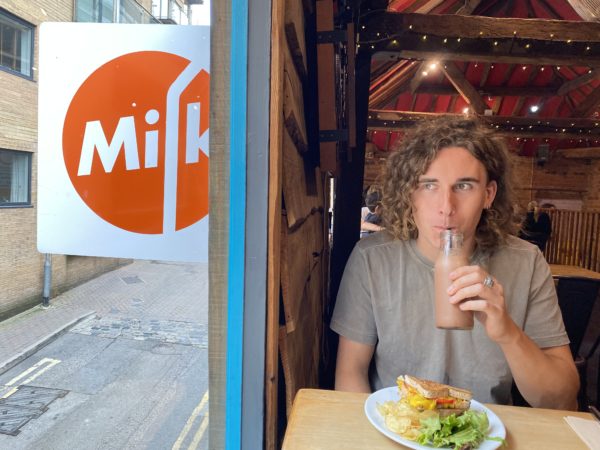
As a student with a chronic illness, this is what navigating university life has been like
I don’t think of myself as ill
On 1st December 2017, I was diagnosed with type one diabetes. It came completely out of the blue and overnight, my life had changed. Now, over four years on, it still feels like it may have happened to someone else or if I disconnected my insulin pump that my blood sugar would stay at a normal, healthy level. Coming to university was a new and exciting challenge in managing this condition.
Type one diabetes is a result of the body attacking the insulin producing cells of the pancreas. Insulin is a hormone that regulates blood sugar levels and allows the body to use glucose, from the food we eat, for energy. Type one diabetics produce little to no insulin so we must inject it ourselves as we all need insulin to live.

Sometimes the burden of a chronic illness is easily masked. But when I’m really tired, hungover or feeling emotional, the scale of the task at hand becomes apparent – I didn’t choose to do the job of a pancreas 365 days of the year. Every three days I fill a new pump with insulin and attach it to my body. Every few hours I check my blood glucose. Every time I eat, I make a dosing decision. Every two weeks I put on a new blood glucose sensor. There is no break. There exists a routine where life is measured by these events. With each new pump I think, God where has the time gone?
With diabetes comes low and high blood sugar which can cause physical symptoms such as headaches, blurred vision, sweating, shakiness, irritability, fatigue and feeling sick. Each blood sugar extreme requires action. I am frequently bleeping and I often feel that I am half robot.
Wherever I go, diabetes comes with me
Living with diabetes has forced me to go with the flow. Many factors affect blood glucose like illness, stress, exercise, food, alcohol and even the weather. It is a constant balancing act of regulating blood sugar to allow me to lead a full, healthy life. University can pose many situations that make me feel like I’m quite literally on a rollercoaster of highs and lows. I remember worrying as a fresher that if I had a low blood sugar whilst meeting someone new, I wouldn’t come across completely as myself. Or if my blood sugar was high, I might have been shorter with someone and more irritable. I’ve been stood in clubs with a low blood sugar, feeling like the ground was about to swallow me up but to the outside world I’m just a guy out clubbing.
I’ve had issues getting into clubs before with my insulin needles and glucose tabs that look suspiciously like something else – diabetes comes with me on every night out. I’ve encountered the same problem passing the barrier at festivals. Before my diagnosis, someone pulling out a needle and injecting themselves in the stomach or arm may have looked a little odd. Now, injections and blood glucose checks feel like second nature. I just wish it was as normal to other people too. The quirks of chronic illnesses should be accepted as norms and this can only happen through raising awareness of chronic illnesses such as type one, endometriosis, coeliac, or crohns. As a particularly high blood glucose can make a diabetic appear drunk and angry, it’s even more important that bouncers and event stewards have the awareness of certain conditions and how it comes into play with behavioural changes.

In catered halls last year it was a challenge knowing how much insulin to inject at each meal. The dose of insulin is directly dependent upon the quantity of carbohydrate and therefore it is always prone to change. Too much insulin and my blood sugar would go low and too little, my blood sugar would sky rocket up. Once this decision had been made, you’re then chucking questionable volumes of alcohol into the mix and seeing how your body reacts. Each day is a science experiment but you come to know what works.
It can be easy to feel like our differences define who we are
Chronic illnesses unite people as much as they isolate people. They exist a lot of the time hidden from view, behind the frontier of a healthy looking person. I love seeing another type one ‘in the wild,’ recognisable by the medical technology that they wear. I don’t consider myself as ill. A lot of the time I think that the cells inside my pancreas are listening to the mantras and chants and meditations that tell each cell of my body that I am both healed and healing.
For much of my teens I was sick. I would have fevers each summer, I had all the signs that something wasn’t quite right. At university, it can be easy to feel like our differences define who we are, that we have to make them apparent and outlined to forge our identity. I’ve learnt that really we are defined by who we are in the present moment, in the here and now.
The randomness of student life can make it hard when managing diabetes. Going for a run, or even walking to campus can require planning which involves bringing snacks and spare pumps. So the spontaneity of plans being made at university, particularly on a night out, can feel overwhelming, but I’ve found it’s as much of a reason to get out of my comfort zone as it is to take it easy.

Diabetes, like a lot of other chronic illnesses is largely misunderstood and misrepresented in the media. Type one diabetes is completely different to type two diabetes. But part of the deal of living with a chronic illness is accepting that a lot of the time, people won’t understand what you’re going through or what your condition involves. That is okay. At university and in life, you see that there are a lot of people each going through something of their own.
There can be an overwhelming sense of empowerment in living with a chronic illness and being an advocate for your health. It has made me appreciate and display gratitude for the everyday in my life. It has confronted me with a choice of how to live and thrive with diabetes. There is joy in the journey.
Here in the UK I have the luxury of the NHS. At the moment, many Ukrainian type one diabetics are at risk of dying as a result of insulin, food and medical supplies shortages. You can donate here.
If you have been impacted by this story, you can find advice about type one diabetes from the NHS here, and specifically about living with it at university here. You can find support from the university here.
Related articles recommended by this author:
• Rock City issues apology after refusing entry to diabetic Nottingham Trent student
• As a student with ADHD, this is what my university experience has been like
• Realistic changes you can make as a Notts student to live a healthier lifestyle









































